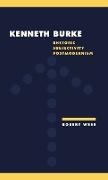Read more
Kenneth Burke, arguably the most important American literary theorist of the twentieth century, helped define the theoretical terrain for contemporary literary and cultural studies. His perspectives were literary and linguistic, but his influences ranged across history, philosophy and the social sciences. In this important and original study Robert Wess traces the trajectory of Burke's long career and situates his work in relation to post-modernity. His study is both an examination of contemporary theories of rhetoric, ideology and the subject, and an explanation of why Burke failed to complete his Motives trilogy. Burke's own critique of the "isolated unique individual" led him to question the possibility of unique individualism, a strategy which anticipated important elements of post-modern concepts of subjectivity.
List of contents
1. Ideology as rhetoric; 2. Counter Statement: aesthetic humanism; 3. Permanence and Change: a biological subject of history; 4. Attitudes towards History: the agon of history; 5. The Philosophy of Literary Form: history without origin or telos; 6. A Grammar of Motives: the rhetorical constitution of the subject; 7. A Rhetoric of Motives: ideological and utopian rhetoric; 8. The Rhetoric of Religion: history in eclipse.
Summary
Kenneth Burke's influence ranged across history, philosophy and the social sciences. Robert Wess's important study examines Burke's influence on contemporary theories of rhetoric and subjectivity. This 1996 book is a judicious exposition of Burke's long career and a crucial intervention in critical debates surrounding rhetoric, history, and human agency.

